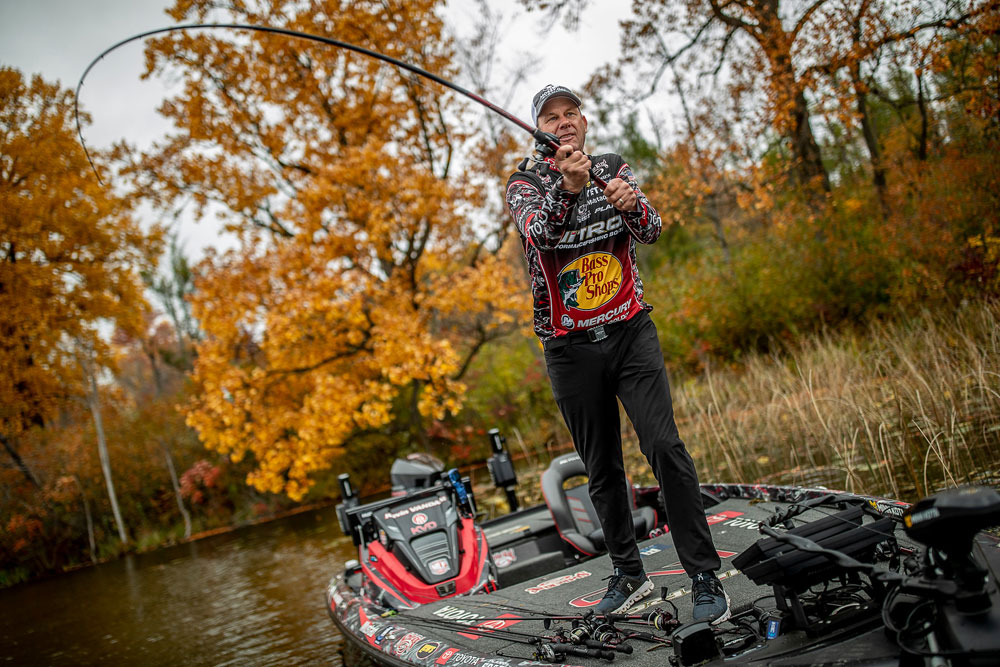provided by John E. Phillips
Mossy Oak wanted to know how Mossy Oak Fishing Pro Kevin VanDam of Kalamazoo, Michigan, finds and catches bass. Kevin VanDam is one of only two professional fishermen to win four Bassmaster Classics. He’s also won three Major League Fishing Cups and is one of the fastest anglers finding and catching bass in every tournament he attends. He’s a very detailed angler and a keen observer of everything around him when he’s on the water. Sights and signals that most bass fishermen completely overlook are some of the keys to VanDam’s success. To learn more about VanDam, visit his web page at http://kevinvandam.com/.

Mossy Oak: Kevin, tell us about a time where you weren’t able to practice and were forced to fish in the moment but still did well in a tournament.
VanDam: We were fishing at La Crosse, Wisconsin, for a Major League Fishing Cup event, and I’d made it to the championship round. I fished the entire first period trying to find bass to catch. I fished the main river and wing dams – all places where I’d been successful fishing in earlier rounds. However, I didn’t catch a scorable bass. I was blanked during that first round.
However, as I fished down the lake, I saw a bass break the water at the mouth of a canal in front of me. I immediately quit fishing and motored to the mouth of that canal. At the time, I was 27 pounds behind the leader, Todd Faircloth. I was the only angler in the Championship Round who hadn’t caught a scorable bass. When I reached the mouth of that canal, I cast a jerkbait in the spot where I’d seen the bass break water. I began catching a bass every cast, until the buzzer went off to signify the end of the round. I’d caught between 16 and 17 pounds of bass before I had to stop fishing. When the next period started, I went straight back to the mouth of that canal, started fishing my jerkbait again and had great success, until the bass stopped biting the jerkbait. I switched tactics and fished a shaky-head worm because I could see the school of bass holding on the bottom in the mouth of that canal. Seeing that told me that the fish hadn’t left the region - they’d just moved from being suspended up near the surface and had gone down to the bottom. When the tournament ended, I had boated 80 pounds of bass and won the tournament.
Noticing that bass breaking the water in the mouth of the canal from a pretty good distance away was the cue that caused me to give up the pattern I’d caught bass on during the first rounds of the tournament. Paying attention to that cue allowed me to not only go from 0 pounds to 16 pounds of bass before the end of that fishing period, but also to catch enough weight to win the event during those next periods. Little cues that you spot while fishing mean you must be willing to change quickly from where you’re fishing and the lures you’re using that you think will catch the bass in that spot and then when the bass quit biting, being willing to move deeper or to another location. These decisions by an angler can be the difference in being a huge success or a total failure fishing for bass.
Mossy Oak: Kevin, other than seeing that bass break the surface in a canal way in front of you, what else caused you to win that tournament?
VanDam: I didn’t stop and fish until I had run a lot of water, made numbers of casts and fished plenty of non-productive water. For me, the most important aspect of my bass fishing is finding the fish before I fish for them. When I’m not being productive in the areas where I think I should catch bass, I continue to fish different places with various lures to attempt to locate the bass before I start trying to catch the bass. I think many times anglers spend much of their time and energy trying to catch bass before they even find the bass.



























